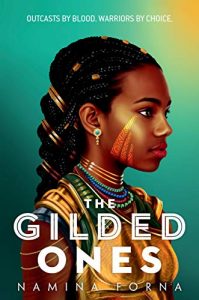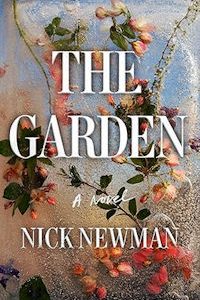Maya C. James Reviews The Gilded Ones by Namina Forna
 The Gilded Ones, Namina Forna (Delacorte Press/Penguin Random House 978-1-984-84869-7, $18.99, 432pp, hc) February 2021.
The Gilded Ones, Namina Forna (Delacorte Press/Penguin Random House 978-1-984-84869-7, $18.99, 432pp, hc) February 2021.
If you are in search of a feminist, epic fantasy filled with formidable girls healing from their trauma, killing monsters in the style of 300, and discovering their inner power despite the patriarchy, you may want to start with The Gilded Ones.
All 16-year-old Deka wants is acceptance from her village, even if that means facing a terrifying blood-letting ceremony that distinguishes pure women from impure women. But on the day of her ceremony, Deka’s blood runs gold: the color of the alaki – nearly immortal demons with superhuman strength and abilities. Now Deka must make a difficult choice: use her powers to fight for the emperor, or accept her gruesome fate in the only home she’s ever known.
Namina Forna makes her fantasy debut with The Gilded Ones, a West-African inspired YA dark fantasy about powerful girl warriors and the cowardly men who abuse them. In this first novel of the Deathless series, we follow Deka’s journey from her secluded village up north, to her brutal training that primes her for a lifetime as a warrior. As she grows into her powers alongside her alaki sisters, she discovers that many things in her life are more nefarious than they once seemed. Deka’s preconceived notions of her worth as a girl and an alaki come into question: is she a girl, a demon, or something else entirely?
This question, among others, haunts Deka and her friends as they face two major threats in the novel. First, the mortal threat of deathshrieks: ruthlessly violent creatures that raid villages and seemingly indiscriminately murder bystanders. The next threat comes from different monsters – the men and women who sustain the violently patriarchal society that convinces these girls they are unworthy of humanity.
While there are some common themes found in most dark fantasy YA novels (an unusual child with a special gift, a mentor, the magical quest, rigorous training, etc.), Forna essentially guides us through a version of the hero’s journey that has a key difference: everyone despises the hero because of her gender.
If it isn’t already clear, gendered, sexual violence is a crucial part of this novel. Forna’s approach to this difficult topic manages to avoid the trappings of a generic “girl power” YA fantasy novel (think girls with swords, fists, and no emotional depth). Forna has also spoken out against sexual violence in her other writings, and the book depicts gender-based trauma surrounding sexual violence in a way that reflects this previous knowledge.
Because gendered violence is such a prevalent theme in The Gilded Ones, it is worth noting that the violence in this book may seem gratuitous to some, even if much of it is only alluded to in dialogue. While YA fiction does not necessarily lack extreme violence, the amount of detail Forna offers seems intentional – violence against girls is often swept under the rug, or made out to be a taboo topic to discuss. I appreciate that Forna chose a riskier route with this novel, and made each act of violence an intentional part of her story. I will, however, caution readers on the lower end of the reader age to brace themselves for some of these scenes.
Even though The Gilded Ones is marketed as YA, it is worth reading even for those who do not typically read the genre – if not for the theme, then to read about girls shedding their doubts about their self-worth.
As a writer trained primarily in screenwriting, Forna’s dialogue is where the novel catalyzes: it flows naturally and exhibits Forna’s deep understanding of power dynamics and character building. Forna’s prose is clean, clipped, and precise. No sentence lingers longer than it needs to, and sensory details rarely drag on beyond a few hints. Readers who prefer truly immersive world building may find themselves wanting for creative sensory details, but the dialogue between Deka and the alaki, as well as her interactions with powerful men are the “wow” moments of this novel.
One mildly confusing part of The Gilded Ones is its allusions to racial prejudice. Considering race and colonialism do not appear to be a consistent (if at all) present aspect of the book, or the society’s history, I found it peculiar that colorism was a matter of importance in the beginning, and then seemingly faded away after the opening chapters. While it’s a theme more than worth tackling and interrogating, this element of violence was more of an afterthought when compared to the critical gender analysis present throughout the book. Perhaps this is just the selfish, curious part of myself, but I wanted to understand how race and colorism were created in this world in the same way that ideas of women’s purity and impurity were designed to oppress. The ending of the novel is satisfying, but perhaps a little too easy, with too many surprises laced throughout it. However, because this is the first novel in a series, I suspect that some plot elements will be further explained in subsequent books.
Debut novels are exciting – especially when they have a cover as stunning as Namina Forna’s The Gilded Ones. As a book that has generated tremendous excitement and unfortunate setbacks (the book was initially slated to be released in 2020), Forna crafted a story that certainly met these expectations.
Maya C. James is a graduate of the Lannan Fellows Program at Georgetown University, and full-time student at Harvard Divinity School. Her work has appeared in Star*Line, Strange Horizons, FIYAH, Soar: For Harriet, and Georgetown University’s Berkley Center Blog, among others. She was recently long listed for the Stockholm Writers Festival First Pages Prize (2019), and featured on a feminist speculative poetry panel at the 2019 CD Wright Women Writer’s Conference. Her work focuses primarily on Afrofuturism, and imagining sustainable futures for at-risk communities. You can find more of her work here, and follow her on Twitter: @mayawritesgood.
This review and more like it in the May 2021 issue of Locus.
 While you are here, please take a moment to support Locus with a one-time or recurring donation. We rely on reader donations to keep the magazine and site going, and would like to keep the site paywall free, but WE NEED YOUR FINANCIAL SUPPORT to continue quality coverage of the science fiction and fantasy field.
While you are here, please take a moment to support Locus with a one-time or recurring donation. We rely on reader donations to keep the magazine and site going, and would like to keep the site paywall free, but WE NEED YOUR FINANCIAL SUPPORT to continue quality coverage of the science fiction and fantasy field.
©Locus Magazine. Copyrighted material may not be republished without permission of LSFF.





